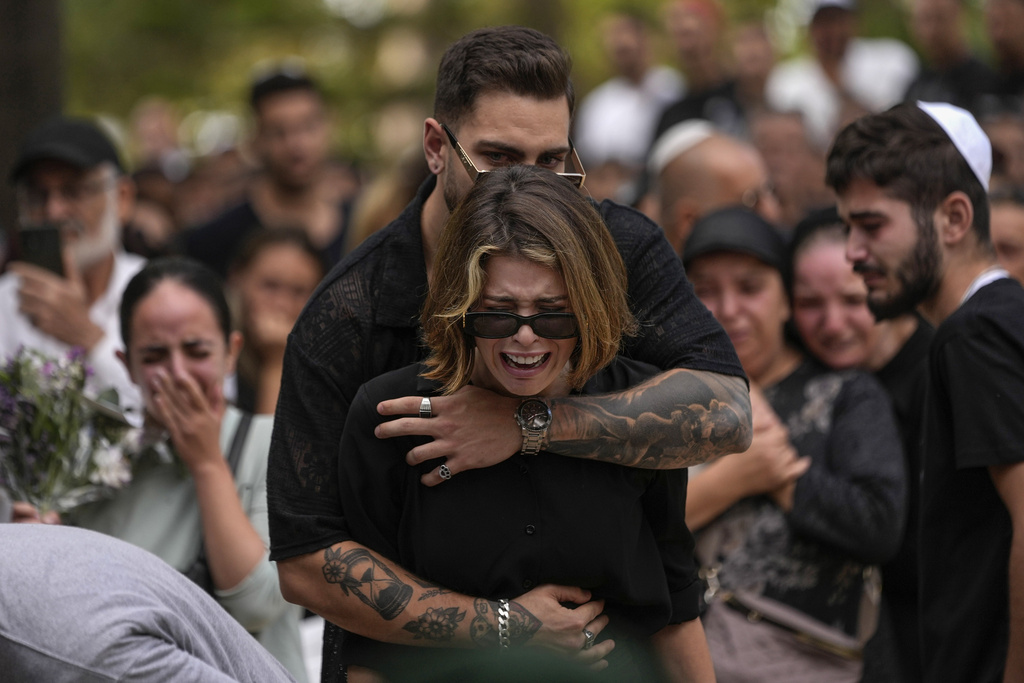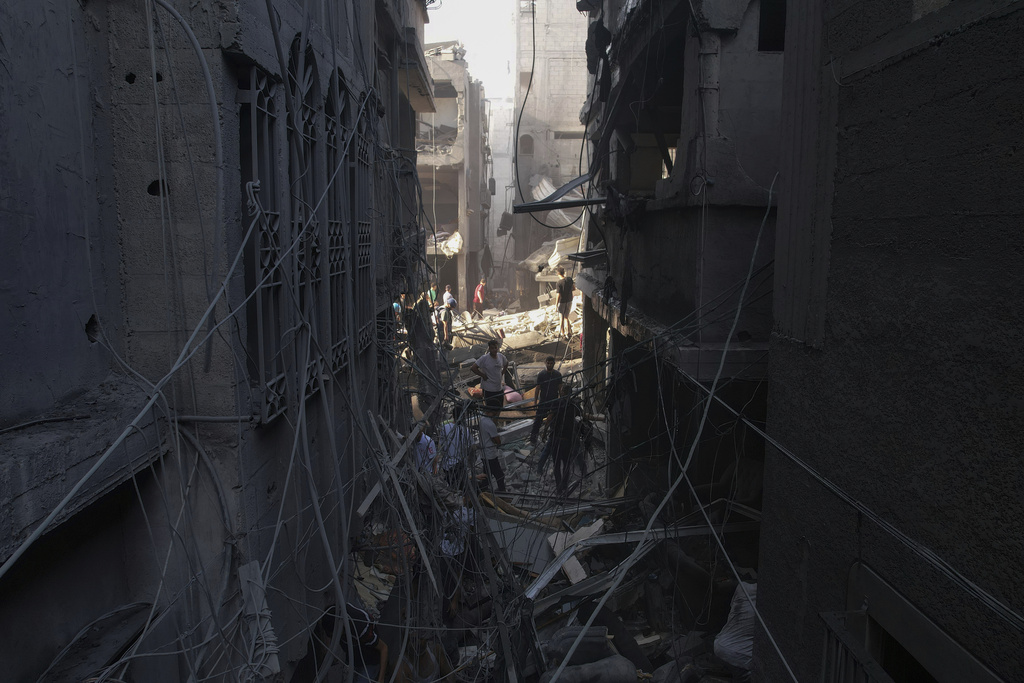JERUSALEM (AP) — Palestinians began a mass exodus from northern Gaza Friday after Israel’s military told some 1 million people to evacuate toward the southern part of the besieged territory, an unprecedented order ahead of an expected ground invasion against the ruling Hamas militant group.
The U.N. warned that so many people fleeing en masse — almost half the Gaza population — would be calamitous, and it urged Israel to reverse the order. Families in cars, trucks and donkey carts packed with blankets and possessions streamed down a main road out of Gaza City, the biggest city.
Israel hammered neighborhoods in southern Gaza with airstrikes on Friday, and it said ground troops have conducted temporary raids in the territory to battle militants, search for weapons and evidence of the missing hostages.
Hamas, which staged a shocking and brutal attack on Israel nearly a week ago and has fired thousands of rockets since, called on people to stay in their homes, saying the order was “psychological warfare” to break their solidarity.
Many hesitated to leave, fearing nowhere was safe in the tiny territory under constant bombardment by Israeli airstrikes. Gaza is sealed off from food, water and medical supplies and under a virtual total power blackout.
“Forget about food, forget about electricity, forget about fuel. The only concern now is just if you’ll make it, if you’re going to live,” said Nebal Farsakh, a spokesperson for the Palestinian Red Crescent in Gaza City, as she broke into heaving sobs.
A ground offensive in Gaza, which is ruled by Hamas and where the population is densely packed into a sliver of land only 40 kilometers (25 miles) long, would likely bring even higher casualties on both sides in brutal house-to-house fighting.
Hamas’ assault Saturday and smaller attacks since have killed more than 1,300 people in Israel, including 247 soldiers — a toll unseen in Israel for decades — and the ensuing Israeli bombardment has killed more than 1,530 people in Gaza, according to authorities on both sides. Israel says roughly 1,500 Hamas militants were killed inside Israel, and that hundreds of the dead in Gaza are Hamas members. Thousands have been wounded on both sides.

As Israel pounds Gaza from the air, Hamas militants have fired thousands of rockets into Israel. Amid concerns that the fighting could spread in the region, Syrian state media reported that Israeli airstrikes on Thursday put two Syrian international airports out of service.
The relentless barrage on Gaza — which the military said has so far involved 6,000 munitions — left Palestinians running through streets, carrying their belongings and looking for safety
A strike Thursday afternoon in the Jabaliya refugee camp took down a residential building on families sheltering inside, killing at least 45 people, Gaza's Interior Ministry said. At least 23 of the dead were under the age of 18, including a month-old child, according to a list of the casualties.
The home belonging to the al-Shihab family was packed with relatives who had fled bombing in other areas. Neighbors said a second house was hit at the same time, but the toll was not immediately known. The Israeli military did not immediately respond to a request for comment.
“We can’t flee because anywhere you go, you are bombed," one neighbor, Khalil Abu Yahia, said. "You need a miracle to survive here.”
The number of people forced from their homes by the airstrikes soared 25% in a day, reaching 423,000 out of a population of 2.3 million, the U.N. said Thursday. Most crowded into U.N.-run schools.
Families were cutting down to one meal a day, said Rami Swailem, a 34-year-old lecturer at al-Azhar University, who had 32 relatives sheltering in his home. Water stopped coming to the building two days ago, and they have rationed what’s left in a tank on the roof.
Alaa Younis Abuel-Omrain has been staying in a U.N. school after a strike on her home killed eight members of her family — her mother, aunt, a sister, a brother and his wife and their three children. Most bakeries stopped producing bread for lack of electricity.
“Even if there is food in some areas, we can’t get to it because of strikes,” she said.
On Wednesday, Gaza’s only power station ran out of fuel and shut down, leaving only lights powered by scattered private generators.

Hospitals, overwhelmed by a constant stream of wounded and running out of supplies, have only a few days worth of fuel before their power cuts off, aid officials say.
“Without electricity, hospitals risk turning into morgues,” said Fabrizio Carboni, regional director of the International Committee of the Red Cross. Newborn incubators, kidney dialysis machines, X-ray equipment and more, are all dependent on power, he said.
Ambulance crews carrying bodies to the morgue at Gaza’s biggest hospital, Shifa, found no space left. Dozens of full body bags were lined up in the hospital parking lot. Fourteen health facilities have been damaged in strikes, health officials said Thursday.
With Israel sealing off the territory, the only way in or out is through the crossing with Egypt at Rafah, but Egypt's Foreign Ministry said Thursday that airstrikes on Rafah have prevented it from operating. Egypt has been trying to convince Israel and the United States to allow aid and fuel through the crossing.
Israel is employing a new tactic of leveling whole neighborhoods, rather than just individual buildings. Hecht, the military spokesman, said targeting decisions were based on intelligence on locations being used by Hamas and that civilians were warned.
“Right now, we are focused on taking out their senior leadership,” Hecht said. The military said strikes have hit Hamas’ elite Nukhba forces, including command centers used by the fighters in Saturday’s attack, and the home of a senior Hamas naval operative used to store weapons.
Israeli Prime Minister Benjamin Netanyahu vowed to “crush” Hamas after the militants stormed into the country’s south on Saturday and massacred hundreds of people, including killings of children in their homes and young people at a music festival.
Amid grief and demands for vengeance among the Israeli public, the government is under intense pressure to topple Hamas rather than continuing to try to bottle it up in Gaza.
In a video released Thursday, civilian Hamas figures defended the group’s rampage and decried the civilian deaths in Gaza from six days of Israeli airstrikes. The solemn video lacked the bravado of a recording aired Saturday by Hamas’s military wing that hailed “the greatest battle” as the massacres were still taking place.
Basem Naim, a former Hamas government minister, said that in the “swift collapse” of the Israeli military on Saturday, “chaos prevailed and civilians found themselves in the middle of the confrontation." The claim is contradicted by countless videos and survivor accounts of Hamas militants deliberately targeting and killing civilians in Israel.
Naim added that there would be no action to free the 150 captives taken back into Gaza while Israel's operation continued.
Israel was a nation in mourning. At a funeral for a 25-year-old woman killed with at least 260 other people at a desert rave, and at another service for a slain Israeli soldier, mourners sat cross-legged on the ground next to caskets, wailing or quietly weeping.
In Gaza, too, mourners buried families together in shrouds. At one funeral, they placed the battered body of a little girl in the arms of her slain father.
Brewing anger over Israeli military and intelligence failures in the surprise attack is being directed at Netanyahu’s far-right government, which for months advanced a contentious legal overhaul that divided the country and affected the military.
In what appeared to be a first admission of fault from a government member, Israeli Education Minister Yoav Kisch told Israeli news outlet Ynet: “We are responsible. I, as a member of the government, am responsible. We were dealing with nonsense.”
Israel’s public diplomacy minister quit, the first fissure in Netanyahu’s government since the onslaught.
Four previous conflicts ended with Hamas still firmly in control of the territory it has ruled since 2007. Israel has mobilized 360,000 reservists, massed forces near Gaza and evacuated tens of thousands of residents from nearby communities. A new war Cabinet, which includes a longtime opposition politician, was sworn in Thursday to direct the fight.
A high-ranking Hamas official, Saleh Al-Arouri, warned Thursday that any Israeli invasion of Gaza “will turn into a disaster for its army,” saying the group was prepared to respond.
Blinken’s visit underscored American backing for Israel’s retaliation.
“You may be strong enough on your own to defend yourselves, but as long as America exists, you will never have to,” Blinken said after meeting with Netanyahu in Tel Aviv.
Blinken said he told Netanyahu that it was “so important to take every possible precaution to avoid harming civilians.”
Blinken will also meet Palestinian President Mahmoud Abbas, whose authority is confined to parts of the occupied West Bank, and Jordan’s King Abdullah II. U.S. Defense Secretary Lloyd Austin planned to visit Israel on Friday.
___
Shurafa reported from Gaza City, Gaza Strip. Associated Press writers Amy Teibel and Isabel DeBre in Jerusalem; Sam McNeil in Be’eri, Israel; Jack Jeffrey and Samy Magdy in Cairo; Samya Kullab in Baghdad and Kareem Chehayeb in Beirut contributed to this report.
